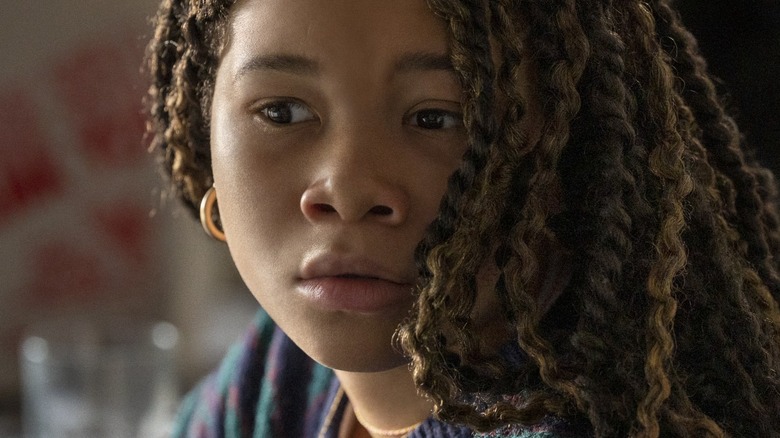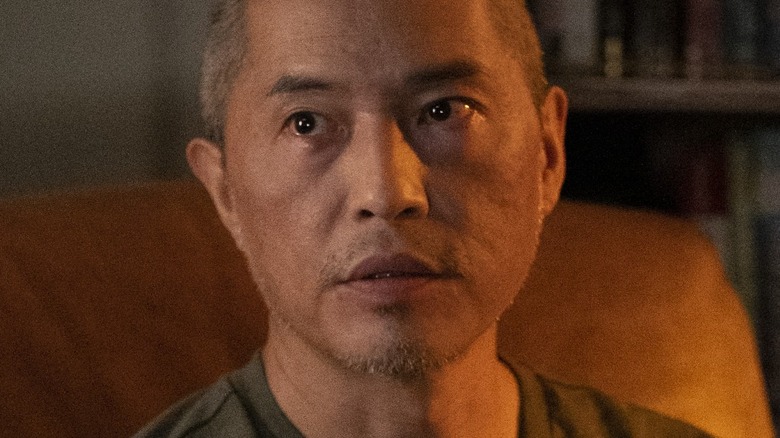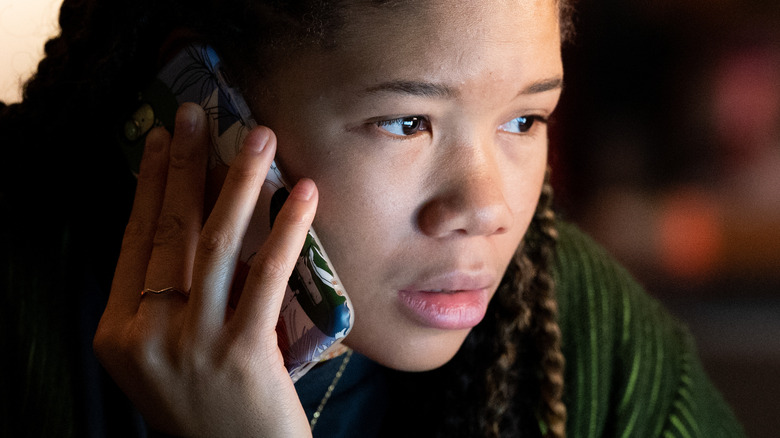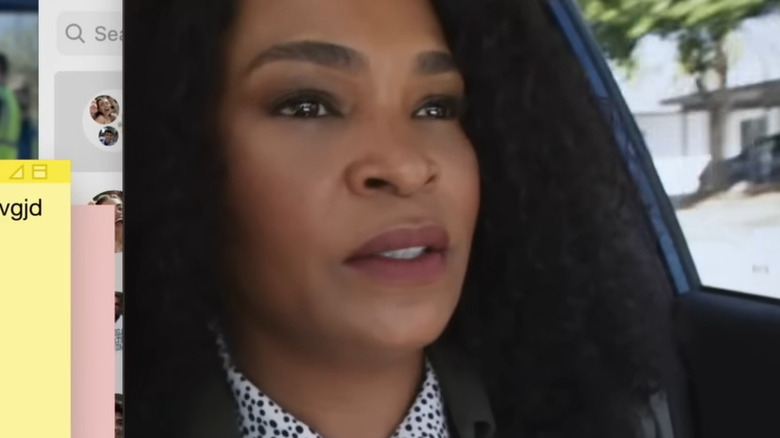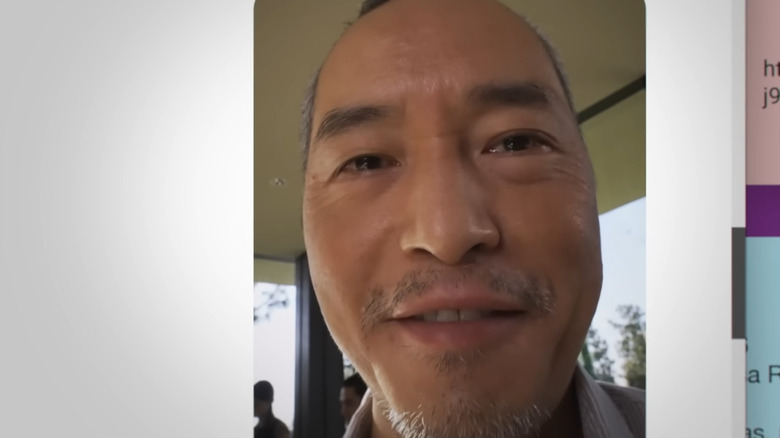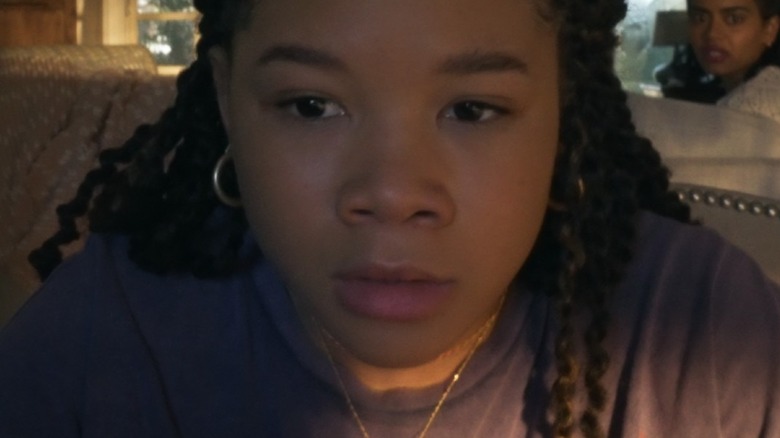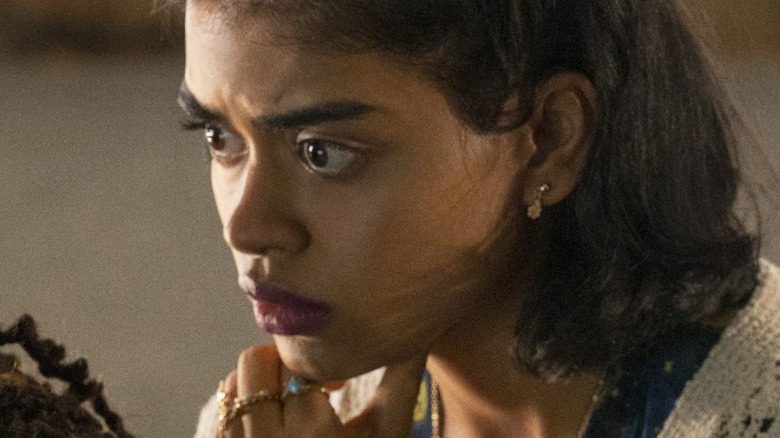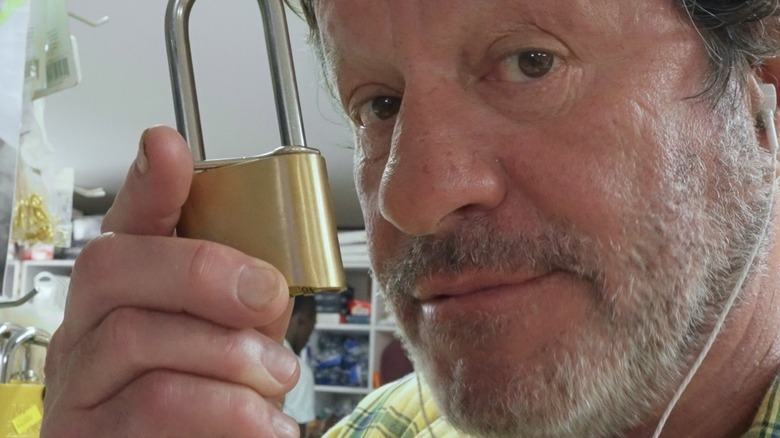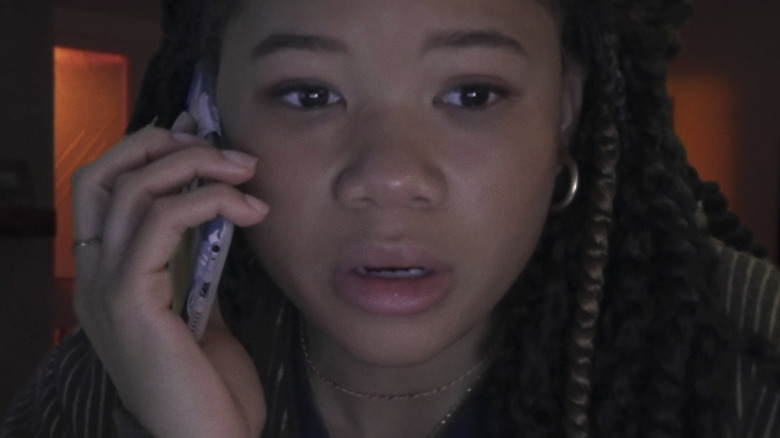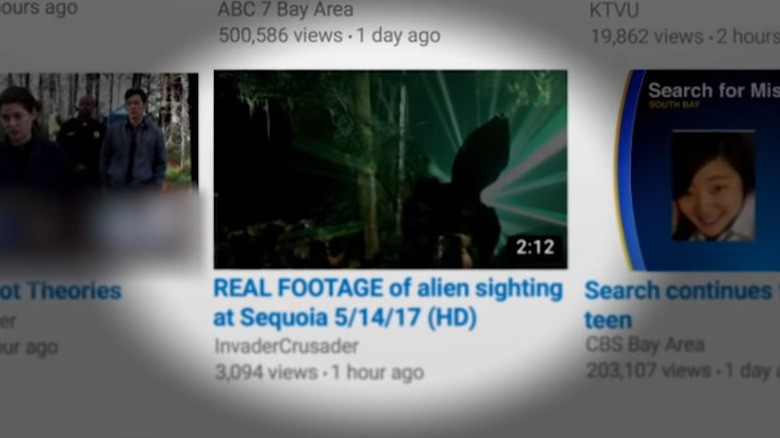The Ending Of Missing Explained
What happens when your mother goes missing while on vacation abroad? Audiences will tumble down the rabbit hole with "Missing," the latest entry in computer-spurred thriller flicks, starring Storm Reid and Nia Long.
The film details June (Reid), who is enjoying some free time while her mother Grace (Long) is on vacation with her boyfriend Kevin (Ken Leung). But when the return flight comes ack without mother, and its increasingly clear she won't be making it home, June becomes determined to figure out what happened to her mother in Colombia.
Increasingly, nothing is as it seems while June uncovers new information on Kevin, Grace, and even her deceased father James (Tim Griffin). Information spirals out of control as videos surface and identities are revealed, revealing exactly who has June's best interests at heart and who could be responsible for her mother's disappearance.
The film is a standalone, quasi-sequel to 2018's "Searching," which starred John Cho and told the screen-set story of a dad desperately trying to find his teen daughter. You might think the first film prepared you for a similar path with the second, but you'd be wrong. Below, all the (spoiler-heavy) details of the twisty "Missing" final act, explained.
Kevin isn't who we think he is
It should come as no surprise that Kevin turns out to be a bit shady. While the trailer hints at him having other identities, Kevin's true nature ascends to a new level by the end of the film.
Audiences find out that he served time for tax evasion and fraud due to money-related cons. He swindled tons of women out of money. However, when he meets Grace, he has changed. He's using his real name, hasn't broken his probation, and has a sponsor through a church group. It seems like he is working to turn his life around and be a better person. Kevin comes across as genuine, even attempting to tell June he is planning to propose on their vacation.
However, this is far from the truth. He falls back into his old ways, finding a way to steal Grace's money and cause her disappearance with the help of a friend. Though he plays the part of a doting boyfriend well, he never had positive intentions; he reached out to Grace with the intention of conning her.
His character is an example of how easy it can be to be conned by someone you trust. He is persistent, which Grace liked, and he is honest and open, creating a deliberate ruse to lure her in — ultimately using her own personality against her.
June's father isn't dead
Audiences are introduced to the central family of "Missing" via a home video. In it, June is a young child, playing with her dad James. As Grace enters the room, she takes the camera and records as James' nose begins to bleed. The video cuts off as Grace clips the video, removing a portion before saving it in a folder labeled "For June." She then proceeds to delete several personal accounts, including a Google account. The audience assumption is made that he was sick and died, especially after articles about cancer can be seen on the computer screen.
However, this is all a lie. James never died. He was actually in jail for the last 12 years, which would make June around six years old when the video was taken, serving time for drug possession after his wife turned him in. Suddenly, the video has a different tone. His nose is not bleeding from a tumor or something related to cancer, but because of drug use.
When June realizes her father isn't dead, her world turns upside down. She mourns him on Father's Day, then comes to mourn the life she had without him when she discovers he's alive. It's a difficult position for anyone to be in, let alone someone who just turned 18.
Grace isn't her mother's real name
Grace's actions seem rash until the entire story is revealed. While the internet believes Grace changed her name due to something sinister, it's actually a sad story. She used the drugs to put her husband in jail because it was the only way she could get away from his abuse.
The rest of the video clip, which is cut off at the start of the film, shows that James is an abusive person. In digital communications between them, he uses common manipulation tactics in abusive relationships, such as saying that won't be able to provide for herself and that he will always find her. Search histories re also glimpsed, where she has looked up how to cover a bruise and how to report domestic violence.
Sending him to prison for possession ensured he had a longer sentence and gave her the opportunity to escape. Before taking on a new identity, her name was Sarah. She created a new life to protect herself and June, deleting her previous accounts. She left her family behind and moved to a new city, ready for a fresh start.
It's a vivid depiction of what victims of domestic abuse sometimes have to endure. They find it difficult to report their spouses, knowing the law isn't always on their side. She found the courage to report him for a different illegal action and forget everything and everyone she knew. It's a difficult decision to make, but one that ensured her survival.
Heather is more than Grace's friend
Changing your identity isn't an easy task; that's where Heather comes in. June knows Heather as her mother's friend, but in reality, she's also the lawyer that helped mom change her identity pro bono. Heather is the only person in Grace's life that knows her real name and who she is running from. Of course, Kevin knows, both because of his partner in crime and because the film explains that Grace told him.
Everyone in this situation needs a Heather. In Grace's case, it was the woman that helped change her identity. This did put Heather in danger as well, which is why she is blackmailed and ultimately killed in the film. However, she was there for Grace in her time of need, and continued to be a key part of her new friend's support system as she transitioned into a different life.
Grace didn't get on the plane to Colombia
While it seems like Grace and Kevin are having a great time on vacation, based on the pictures he texts June, Grace actually never stepped foot on the plane. On the way to the airport, she was instead kidnapped and replaced with a woman named Rachel. Rachel is a struggling actor who bartends by night to get by. She goes on the trip thinking she is filming a television show.
June discovers this when she notices the photo Kevin sent her of her mother on the plane is a live image. When she watches it, she discovers the woman she thought was her mother is someone she actually doesn't know. Sometime on the way to the airport, she was forced into the trunk, before the car picked up Rachel at an intersection. The goal of this swap was to establish a different point in time when Grace went missing and to keep the blame off Kevin, even though he was involved. If police are searching for a group of Colombians who kidnapped her, their focus won't be on Kevin. For a while, that worked.
Small details can impact an investigation, and until the live photo revelation, there was no reason to believe that Grace wasn't the one in Colombia. Once the switch became known, it changed everything — but still, precious time had already been lost.
Kevin and James know each other
Kevin had a partner in all this, and it is revealed to be James. That's how he knows who Grace is. He and James spent time in the same prison during their sentences, and clearly, they talked.
James has been living in the house seen in the home video, which is only about five hours away from June and Grace. When June discovers this location on Kevin's account, and how often he visits it, she's told it is where his sponsor Jimmy is.
While it isn't established how their plan came together or how long they discussed it before Kevin approached Grace on the dating website, there was forethought and planning put in. Kevin wanted money, and James wanted to get back at the woman he blames for how he spent the last decade of his life. They worked together to make that happen because they needed each other to achieve their goals. Ultimately, however, they both die.
Imprisoned folks concocting plans behind bars is a common cliche in movies and television. However, "Missing" takes it a step further in how it's executed. They were in it for the long haul, with Kevin putting in the time to win Grace over before taking her money. He "fixed" June's computer, but actually installed software so James could remotely access her laptop. Every detail was planned, making it a near-perfect crime.
Sometimes hiding is the only way out
"Missing" touches on many things, but one of the main takeaways is that sometimes hiding is the only way of out a situation. After all, it was the only way Grace could leave James and make a new life for herself. From her research, she knew he wouldn't serve a significant amount of time for domestic abuse. She needed another way to ensure he would be kept in the same spot for multiple years, while she rebuilt her life.
The film reasons that there is no shame in hiding. Despite changing her name and leaving her family behind, she still has to hide online. She doesn't post photos of herself on Facebook and seems to keep a pretty low profile. Anything she posts online could be used against her, which the movie shows repeatedly.
Grace isn't the only one hiding out. Kevin is trying to disappear in Colombia after the fake kidnapping, asking James for more money so he can try to get off the grid. He's trying to evade capture, and hiding appears to be the only way to do that. Presumably, James is hiding too. Kevin orders and sends the security cameras used on the property. Why wouldn't James do that himself?
Web sleuthing can help in certain situations
When audiences are introduced to June, she's watching a show titled "Unfiction." It's a run-of-the-mill crime series, showcasing dramatizations of popular or widespread cases. The episode June is watching is a direct callback to "Searching," because it's an episode about Margot's disappearance. The series reappears again when Grace's kidnapping is made into an episode that Junes watches at the end of the film.
June's friend Veena (Megan Suri) regularly brings up the series, commenting on tactics used in the show that could perhaps help June locate her mother. This includes tourist cameras in Colombia and breaking into Kevin's email account. For the majority of the film, June's web sleuthing, from finding phone numbers to which hardware store Kevin and Rachel purchased the love lock from, uncovers more than the police investigation.
It's an example of how sometimes an online effort can be beneficial in solving a case. While it doesn't always work and can cause a concerning online dynamic (depicted as it's revealed Grace has another identity), there are times when well-researched web searching can help law enforcement agencies. It goes to show what more eyes on something can do, particularly when they are eyes that don't have several other cases to juggle at the same time.
Javi has a happy ending
Javier (Joaquim de Almeida), the GoNinja worker who is June's eyes and ears in Colombia, has a difficult relationship with his son. After his wife died, Javier found that his son didn't reach out to him anymore. The man didn't begrudge that, telling June that his son knows where he is and how to contact him. June encourages him to reach out, even telling him in a fit of frustration that he gave up on his son, but she won't give up on her mother.
The end of "Missing" includes a time jump. As June goes through her computer screen, we can see she still talks to Javi. Included in their text thread is a photo of him with a younger-looking man, and they both look really happy. Audiences can hope that this is Javi and his son, finally reunited after their time apart. It's a brief look into his life, but it gives viewers everything they need to know.
June and Grace's relationship
When viewers meet June and Grace, their relationship is pretty typical of a teenage girl and her mother. June doesn't want to listen, and Grace is a bit overbearing. June is upset that Heather will be stopping by to check on her, even cold-shouldering her mother as she leaves for Colombia.
However, by the end of "Missing," their relationship has changed considerably. After going through such an ordeal, a new bond is forged between the two. The time jump, which seems to be anywhere from six months to a year since June is away at college, shows there is a new understanding and level of communication between mother and daughter. Instead of ignoring texts and calls, June is apologizing for accidentally hanging up early on her mother.
This new dynamic shows how shared traumatic events can bring people closer together. In June's case, she changes how she communicates with her mother. Despite learning her mother's history, that her father was still alive, and watching her mother bleed out, June has found the positive in a horrible situation and mended what could be described as a slightly-strained relationship.
Our relationship with the aliens isn't any better
Fans of "Searching" may spot a secret subplot hiding within the quasi-sequel. The first film of the series included a subplot glimpsed through news tickers and YouTube recommendations depicting an alien invasion unfolding around the world; people associated with NASA were being killed, and there was green energy in the skies. It was left unknown how that was resolved, however, because of the time jump.
"Missing" brings this subplot back. Throughout the movie, discussions of "green angels" and "green lightning storms" are present in the background. In particular, Boston experiences a significant green lightning storm, and then the East Coast is on lockdown due to a haze. Based on these events, it seems like an agreement between humans and aliens was never reached, and the otherworldly beings are still coming to Earth.
They are renamed, however, now being referenced as green angels and not aliens. In one case, a hotline to report green angel sightings is mentioned, the text noting it's receiving tons of calls. A "green angel vigilante" is arrested and people protest this. It's clear that the relationship between aliens and humans has shifted, but it isn't obvious if it's positive or not. To call someone going after green angels a vigilante is strong language, but if the two species are on good terms, why would there be a tip line to report sightings? That just might be something for the third film to unpack.
